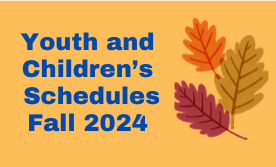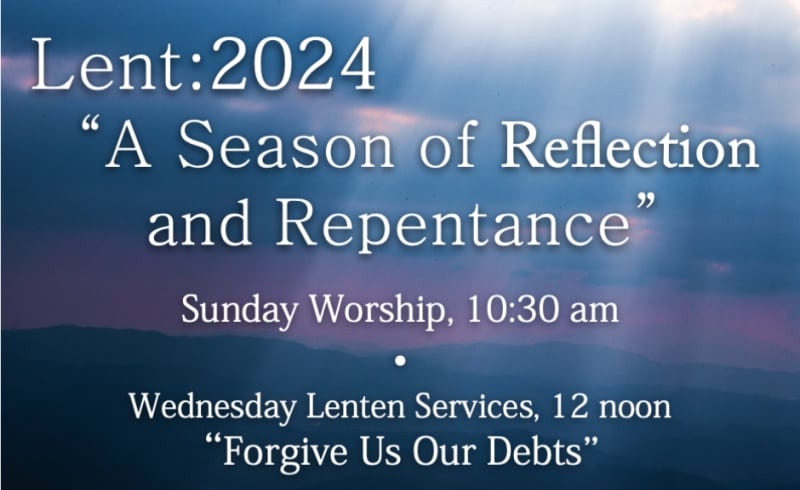Sermon
August 13, 2017: Rev. Dr. Buz Wilcoxon
What’s in a name? My full name is Searcy Allen Wilcoxon, IV. That’s quite a mouthful. Before I was born, my parents knew that this is what they were going to legally name me, but they didn’t have a clue what they were going to call me. Unlike someone who is a Jr. or a Third, there are no good nicknames for someone who is the fourth. Thankfully they didn’t decide to call me “Cuarto.” So, before I arrived they had this quandary over what to call me. And like many large families, their decision quickly became a group project. My great-aunt, that is my grandfather’s sister, noticed that my initials, SAW, spelled the word saw, and so she sarcastically said, “You can call him whatever you want, but I’ll call him my little buzz saw.” It was a joke. She wasn’t being serious…but it stuck. I had a friend in high school who once told me, “Wow, just imagine how different your life would be if she had said “chainsaw” instead of “buzz saw.”
Isaac also got his name from a family joke. A long, joyful, wonderful, laughter-producing joke between God and his parents, Abraham and Sarah. The name Isaac means laughter. It’s the final punchline to the story, but of course the set-up lines weren’t nearly as joyful.
Abraham and Sarah had been called away from their home, called by God’s voice with nothing but a promise to go on. God promised them a family, and a homeland, and a blessing that would spill out into the rest of the world, blessing all the families of the earth. They had been called and they had followed…but that was 24 years ago. 24 years! A lot can change in that long of a time.
Over the last 24 years, Abraham and Sarah had fumbled through life, continuing to wander and to wonder if God would ever live up to these promises. In fact, it had been so long of a time, and they were so old now that they seem to have given up. Maybe deep down in their heart of hearts they still believed, but in the minds they had moved on past that silly hope. They sought to live their lives in the real world not in some fantasy land of dreams.
Now, in today’s world we wouldn’t dare use the word “barren” to refer to a couple experiencing decades of infertility. We are more aware and sensitive to the pains, struggles, and grief that these situations cause in our world and in our families. But in the ancient world, including in the pages of scriptures, that was the image that was used. Bareness—a landscape without life. In the book of Genesis, Sarah, and Rebekah, and Leah are all called “barren” because they are unable to have children. Centuries later, after the Jewish people are conquered by their enemies and their population is taken into exile, the land itself is spoken of metaphorically as a woman who is barren, who has no children. While we as modern people with modern sensibilities may not be comfortable with this outdated language, we need to be aware that when bareness is spoken of in these places in scripture, it is done with a theological purpose in mind. In these stories the life-giving God of creation miraculously overcomes these natural conditions with something supernatural. The final and fullest link in this chain of bareness comes in the New Testament, when Mary, a virgin, conceives a child—something that should be biologically impossible. She is in this long line of biblical women who are a part of God’s covenant story of making a way where there seems no way.
And when our story begins today, Abraham and Sarah have been without a way for so long that they’ve just gotten used to it. By now Sarah was ninety and Abraham was ninety nine. This is just the way things work.
Then, something truly unexpected occurs. God decides to make a surprise visit to Abraham and Sarah disguised in the form of three men who wander up as guests. One of the guests speaks words that sound very odd. He says, “Very soon Sarah shall have a son.” Sarah can’t help but laugh. She tries to hold it in but she laughs. She laughs at the ridiculous notion. Me? 90 years old having a child? I should be in the geriatric unit, not the maternity ward. Sarah laughs at what doesn’t make sense. Elsewhere in the story, Abraham laughs as well. They laughs at what is unexpected. Just like we would. Just like we do. A little child laughs a Peekaboo because they don’t expect what they see. We laugh at a comedian who weaves a surprise into a story that starts out so ordinary. That day, Sarah laughed at the unexpected.
And for years to come, Abraham and Sarah would look back and laugh at themselves. Laugh at how little they knew of what God was up to. For Sarah does conceive. She has a son and they name him, Laughter. Isaac. A constant reminder of the joy and wonder of God’s promise kept. The punchline to the long divine joke. She says, “God has brought laughter for me; everyone who hears will laugh with me.”
The heart of this story, the hinge of the whole series of event lies in the question that God asks to the old couple: “Is anything too wonderful for the Lord?” Is anything impossible for the life-giving, love-sharing, promise-keeping God?
Most days we live our lives like Abraham and Sarah, with our minds focused on our daily tasks and the worries of our world. Both can completely consume our time, our energy, our efforts, our stamina. It’s not so much that actively disbelieve the loving promises of God, but we just art thinking about them. Things like peace, things like love, things like hope and grace and freedom and truth, are honestly, too long in coming these days. We’ve been waiting so long that we’ve forgotten what exactly we’re waiting for. There’s all the horror and division and brokenness of the world…and we’ve got to get the groceries, get dinner on the table, get organized, get to work. We’ve got threats of nuclear war with North Korea; we’ve got violent white supremacists in Virginia…and for crying out loud, it’s the first week of school! At times it feels like we’ve move so far backwards, and there’s so much that has to be done!
We can go through our lives with days, weeks, years that seem closed to wonder, devoid of joy, silently ignoring what it most real and most true. But then, at times that we least expect it, it happens—a surprise visit from God. Sometimes in the words of strangers, sometimes in the rustles of the leaves in the breeze, sometimes in the silence of the sleepless night, sometimes in the in the odd reflection of light, sometimes in the voice of a child. Out of nowhere, we hear it. We hear the promises again and maybe, just maybe, it makes us laugh. We might deny it, but yes, yes we did laugh. To think that it might be true? After all these years? After all this brokenness? To think that we might have hope indeed. That we might find joy at last. That we might truly belong to a God who loves us and all people more than we could ever imagine!
From the pages of scripture we learn that God is in the business of making a way where there seems no way. What seems barren will be filled with life and laughter. What seems lost will be found. What we have broken will be healed and redeemed. What is covered in deep darkness with shine in radiant light. What seems dead, will be raised again in glory. Tears will be whipped from our eyes. Sins will be forgiven. Hunger will be satisfied. Is anything too wonderful for the Lord? Is anything too wonderful for the Lord? In Washington and North Korea, in Charlottesville and in Mobile, in our lives, our families, our schools, our community, is anything too wornderful for the Lord?
What God is able to do through us? What God is able to mold, to create, to build through us? To build a future. To build a hope. To build a promise.
There’s a passage from the book of Isaiah, that very same one I mentioned before, where the whole kingdom is compared to a barren woman because the people are lost through warfare, slavery, and exit—a mother without her children. Then God speaks up and promises that children will come, children will grow. God says, “All your children shall be taught by the Lord,” All your children shall be taught by the Lord. That’s quite a message for Back to School Sunday.
There is an old Jewish midrash teaching about that passage which is based on a play on words…a joke, if you will. The Hebrew word “banayich” means your children, but “bonaich” means your builders. So an ancient rabbi reading the text to his congregations said, don’t read “All your children.” Read, “All your builders.” It was a reminder that all of us (not just children) are called to be builders—builders of God’s promises. All of us are called to be students of God, taught by God’s word. All of us are called to learn, to live, to laugh as those who are working and waiting on God’s promises.
So, as we leave worship today, as we head out into a world filled with so much hate and fear, so much brokenness and discord, let us all, children of God, go out as builders of God’s covenant promises. Let us go out to be blessings for all God’s children, all races, all ages. Let us go to work building the kingdom, as our all-loving God has the last laugh.
Scripture
Genesis 18 & 21 (selected verses)
The Lord appeared to Abraham by the oaks of Mamre, as he sat at the entrance of his tent in the heat of the day. He looked up and saw three men standing near him. When he saw them, he ran from the tent entrance to meet them, and bowed down to the ground. He said, ‘My lord, if I find favor with you, do not pass by your servant. Let a little water be brought, and wash your feet, and rest yourselves under the tree. Let me bring a little bread, that you may refresh yourselves, and after that you may pass on—since you have come to your servant.’ So they said, ‘Do as you have said.’
They said to him, ‘Where is your wife Sarah?’ And he said, ‘There, in the tent.’ Then one said, ‘I will surely return to you in due season, and your wife Sarah shall have a son.’ And Sarah was listening at the tent entrance behind him. Now Abraham and Sarah were old, advanced in age; it had ceased to be with Sarah after the manner of women. So Sarah laughed to herself, saying, ‘After I have grown old, and my husband is old, shall I have pleasure?’ The Lord said to Abraham, ‘Why did Sarah laugh, and say, “Shall I indeed bear a child, now that I am old?” Is anything too wonderful for the Lord? At the set time I will return to you, in due season, and Sarah shall have a son.’ But Sarah denied, saying, ‘I did not laugh’; for she was afraid. He said, ‘Oh yes, you did laugh.’
The Lord dealt with Sarah as he had said, and the Lord did for Sarah as he had promised. Sarah conceived and bore Abraham a son in his old age, at the time of which God had spoken to him. Abraham gave the name Isaac to his son whom Sarah bore him. And Abraham circumcised his son Isaac when he was eight days old, as God had commanded him. Abraham was a hundred years old when his son Isaac was born to him. Now Sarah said, ‘God has brought laughter for me; everyone who hears will laugh with me.’ And she said, ‘Who would ever have said to Abraham that Sarah would nurse children? Yet I have borne him a son in his old age.’








